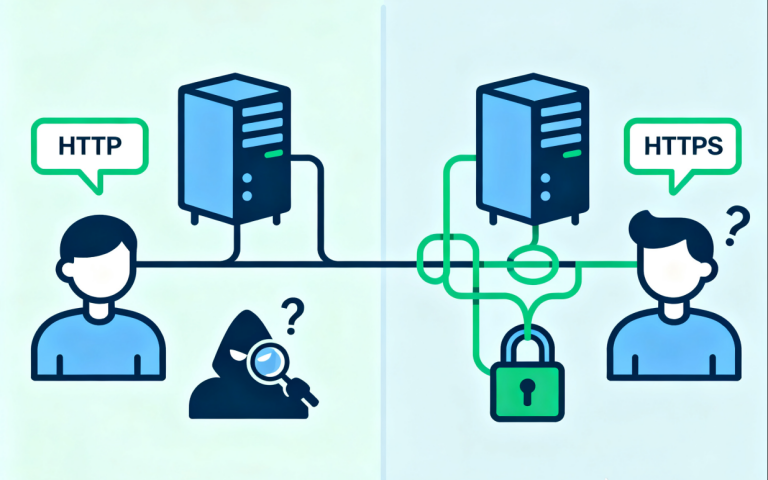
Wait, take a look at your browser's address bar. Do you see a tiny padlock icon there? If you do, that means you're on a secure website. If you don't—if you see something that says "Not Secure" or a red warning sign—that’s a serious red flag. For a moment, it feels confusing, doesn't it? What does that little symbol even mean? What's the difference between a URL that starts with http and one that starts with https? This small, subtle difference is the single most important trust signal you can send to your website visitors, and the lack of it can send them running for the hills. It's a sudden realization that the very foundation of your website's relationship with its users is built on something you might have never fully understood.
The internet, in its simplest form, is a massive conversation. When you visit a website, your browser sends a request to the server, and the server sends back the information—the web page, the images, the data. Now, imagine this conversation is happening in a crowded room. With a standard http connection, everything you say and receive is shouted out loud for everyone to hear. Anyone in that room—a hacker, a malicious third party—can listen in, steal your data, or even tamper with the conversation. It’s an incredibly insecure way to communicate, but for years, it was the standard.
Then came a simple yet profound change. https. The 'S' stands for secure. It’s the difference between shouting in a crowded room and speaking in a private, encrypted language that only you and the person you're talking to can understand. The magic that enables this private conversation is the SSL (Secure Sockets Layer) certificate. It’s not just a technical component; it’s a digital identity card, a key, and a security guarantee all rolled into one. It’s the thing that takes a shout and turns it into a whisper only meant for you.
The Digital Lock: How an SSL Certificate Really Works
To understand why your website absolutely needs an SSL certificate, let’s get a little deeper into how it actually works. When you visit an HTTPS website, your browser and the website's server perform a secret "handshake" process. Here’s what happens in a split second:
Request: Your browser says, "Hello, I want to connect securely."
Identity Check: The website's server sends your browser a copy of its SSL certificate.
Verification: Your browser checks the certificate. It asks a few questions: "Is this certificate valid? Is it from a trusted Certificate Authority? Does it belong to this website?"
Trust Established: If everything checks out, your browser and the server create a secure, encrypted connection. It’s a bit like a mutual trust exercise. Your browser trusts the website because its identity has been verified by a third-party authority.
Once that secure connection is established, all the data that passes between you—login credentials, credit card numbers, personal information—is encrypted. It's scrambled into an unreadable mess that a hacker can’t decipher even if they intercept it. Without an SSL certificate, this whole process is skipped. It’s like skipping the handshake and just shouting your secrets to the crowd. It’s a recipe for disaster.
The Trust Equation: Beyond Just Encryption
You might think, "Well, I don't run an e-commerce site, so I don't need to worry about credit card numbers, do I?" That's a common misconception, and it's dangerously wrong. The need for an SSL certificate extends far beyond financial transactions. It’s about every interaction you have with your users.
Customer Trust: When a visitor sees that "Not Secure" warning, they will hesitate. They’ll likely abandon your site, even if you’re only asking for an email address. That red flag is a direct hit to your credibility. It tells them you haven't invested in their privacy and that your site might be a risk. A green padlock, on the other hand, is a silent, powerful signal of professionalism and trustworthiness.
Data Integrity: It's not just about what you send, but what you receive. Without an SSL certificate, a hacker could intercept the communication and inject malicious code or a virus into your website's content as it’s delivered to a user. This could lead to malware infections on their computer. An SSL certificate ensures that the content your user receives is exactly what your server intended to send, with no interference.
Search Engine Ranking: This is a big one. Google has made it very clear that HTTPS is a ranking factor. Websites with an SSL certificate are favored in search engine results. If you’re competing with a competitor for a top spot, and their site is secure while yours isn't, you are already at a disadvantage. Google's message is simple: secure sites provide a better user experience, and they want to show those sites to their users. It’s a sudden realization that a lack of an SSL certificate isn't just about security; it’s about visibility.
User Experience and Browser Warnings: Modern browsers like Chrome, Firefox, and Safari are actively shaming sites that aren't secure. They display prominent warnings, and some are even beginning to block HTTP content entirely. Do you really want your website visitors to be greeted by a big, scary warning that tells them to turn back? The answer is a definitive no.
The Analogy of the Safe: The Difference Between Trust Levels
You might have heard of different types of SSL certificates, like DV, OV, and EV. This can be confusing, but the concept is straightforward. Think of them as different levels of a safe.
Domain Validation (DV): This is the basic padlock. It confirms that the data is encrypted, but it doesn’t tell the user who is running the site. It’s like a simple lock on a box. You can be sure the contents are safe from prying eyes, but you don't know who owns the box. It’s a good first step, but not enough for serious business.
Organization Validation (OV): This is a verified business certificate. Not only is the data encrypted, but the certificate also confirms the legal identity of the organization that owns the website. It’s like a combination lock with a company name etched into the side. This provides a much higher level of trust. Your visitors can verify that you are a legitimate business, which is crucial for building credibility.
Extended Validation (EV): This is the highest level of trust. It’s like a bank vault with a guard standing in front. To get an EV certificate, the Certificate Authority performs an extensive check of your business, verifying your legal, operational, and physical existence. This is the gold standard for financial institutions and large e-commerce sites.
In conclusion, an SSL certificate is no longer an optional add-on for a website. It is a fundamental, non-negotiable part of your digital presence. It's the silent handshake that builds trust with your visitors. It's the secure line that protects their data. It's the secret key that boosts your search engine ranking. Don't let your business be defined by a little red warning in a browser. Invest in an SSL certificate, and give your customers the peace of mind they deserve.

